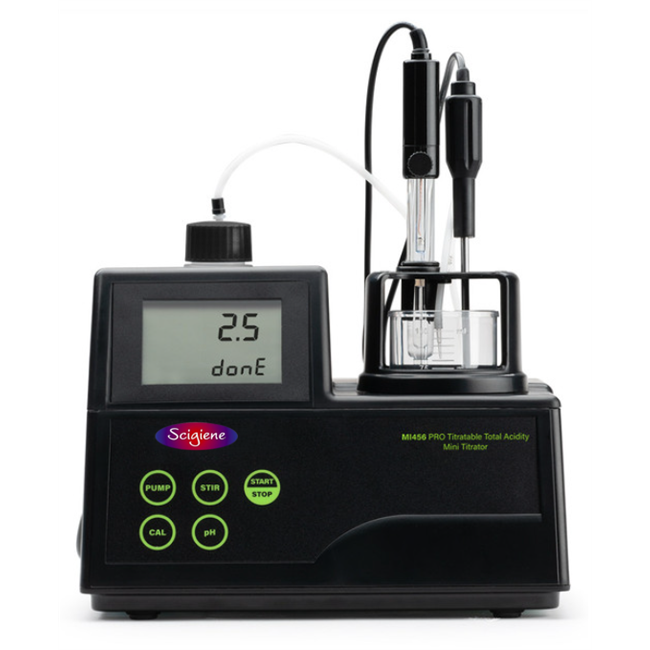For the determination of TITRATABLE TOTAL ACIDITY for wine analysis
This instrument comes with a pre-programmed analysis method for the titratable total acidity measurements on wine sample. Also called TA and sometimes total acidity, titratable acidity is the sum of the fixed and volatile acids present in a wine. This is determined by a chemical process called titration. The titratable acidity is usually expressed in terms of tartaric acid, even though the other acids are also measured. Titratable acidity is expressed either as a percentage or as grams per liter. For example, 0.7% TA is the same as 7 grams per liter (or 7 g/l) TA. Acidity in the must will result in a poor fermentation and a slightly medicinal and flat taste. Too much acid will give the wine an unpleasant sourness or tartness. Some acid is necessary for fermentation, and up to one-fourth of the initial acid content will be consumed by the yeast during fermentation. Low-acid musts are usually corrected by adding tartaric acid (the principle acid in grapes), malic acid, citric acid, or acid blend. An acid testing kit is indispensable in measuring initial acidity.
Features & Specifications:
- Range: 0.0 to 25.0 g/L of tartaric acid
- Resolution: 0.1 g/L
- Accuracy: +/- 5% of reading
- Method: Acid base titration method
- Principle: End-point titration
- pH Calibration: 1 point in selected end-point, 7.00 pH or 8.20 pH
- Sample Volume: 2 ml
- Pump Volume: 0.5 mL/min
- Stirring Speed: 1500 rpm
- Automatic temperature compensation from 0.0C to +100.0C
- pH & Temperature probe included
- Operating Environment: 0C to +50C, Max. 95% RH
- Power Supply: 110V
- Supplied complete with: Calibration standard TA, Titrant TA, Buffer pH 7.0, Buffer pH 8.2, pH Electrode, Temperature probe, Refilling Electrolyte Solution 3.5M KCl, for pH electrodes 230 mL bottle, small stir bar, 2 x 50 mL beakers, 2000 μL pipette, test tube set, O-ring, 1 mL syringe, power cable and instruction manual
